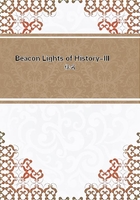
第6章
But the worst thing which the Prophet did in order to gain his end was to make use of the sword. For thirteen years he appealed to conscience. Now he makes it an inducement for men to fight for his great idea. "Different prophets," said he, in his memorable manifesto, "have been sent by God to illustrate His different attributes: Moses, His providence; Solomon, His wisdom; Christ, His righteousness; but I, the last of the prophets, am sent with the sword. Let those who promulgate my faith enter into no arguments or discussions, but slay all who refuse obedience. Whoever fights for the true faith, whether he fall or conquer, will assuredly receive a glorious reward, for the sword is the key of heaven. All who draw it in defence of the faith shall receive temporal and future blessings. Every drop of their blood, every peril and hardship, will be registered on high as more meritorious than fasting or prayer. If they fall in battle their sins will be washed away, and they shall be transported into Paradise, to revel in eternal pleasures, and in the arms of black-eyed houris." Thus did he stimulate the martial fanaticism of a warlike and heroic people with the promise of future happiness. What a monstrous expediency,--worse than all the combined usurpations of the popes!
And what was the result? I need not point to the successive conquests of the Saracens with such a mighty stimulus. They were loyal to the truth for which they fought. They never afterwards became idolaters; but their religion was built up on the miseries of nations. To propagate the faith of Mohammed they overran the world. Never were conquests more rapid and more terrible.
At first Mohammed's followers in Medina sallied out and attacked the caravans of Arabia, and especially all belonging to Mecca (the city which had rejected him), until all the various tribes acknowledged the religion of the Prophet, for they were easily converted to a faith which flattered their predatory inclinations and promised them future immunities. The first cavalcade which entered Medina with spoils made Mussulmans of all the inhabitants, and gave Mohammed the control of the city. The battle of Moat gave him a triumphal entrance into Mecca. He soon found himself the sovereign of all Arabia; and when he died, at the age of 63, in the eleventh year after his Hegira, or flight from Mecca, he was the most successful founder of a religion the world has known, next to Buddha. A religion appealing to truth alone had made only a few converts in thirteen years; a religion which appealed to the sword had made converts of a great nation in eleven years.
It is difficult to ascertain what the private life of the Prophet was in these years of dazzling success. The authorities differ.
Some represent him as sunk in a miserable sensuality which shortened his days. But I think this statement may be doubted. He never lost the veneration of his countrymen,--and no veneration can last for a man steeped in sensuality. Even Solomon lost his prestige and popularity when he became vain and sensual. Those who were nearest to the Prophet reverenced him most profoundly. With his wife Ayesha he lived with great frugality. He was kindly, firm in friendship, faithful and tender in his family, ready to forgive enemies, just in decision. The caliphs who succeeded him, for some time, were men of great simplicity, and sought to imitate his virtues. He was doubtless warlike and fanatical, but conquests such as he and his successors made are incompatible with luxury and effeminacy. He stands arraigned at the bar of eternal justice for perverting truth, for blending it with error, for making use of wicked means to accomplish what he deemed a great end.
I have no patience with Mr. Carlyle, great and venerable as is his authority, for seeming to justify Mohammed in assuming the sword.
"I care little for the sword," says this sophistical writer. "Iwill allow a thing to struggle for itself in this world, with any sword or tongue or implement it has or can lay hold on. What is better than itself it cannot put away, but only what is worse. In this great life-duel Nature herself is umpire, and can do no wrong." That is, might makes right; only evil perishes in the conflict of principles; whatever prevails is just. In other words, if Mohammedanism, by any means it may choose to use, proves itself more formidable than other religions, then it ought to prevail.
Suppose that the victories of the Saracens had extended over Europe, as well as Asia and Africa,--had not been arrested by Charles Martel,--would Carlyle then have preferred Mohammedanism to the Christianity of degenerate nations? Was Mohammedanism a better religion than the Christianity which existed in Asia Minor and in various parts of the Greek empire in the sixth and seventh centuries? Was it a good thing to convert the church of Saint Sophia into a Saracenic mosque, and the city of the later Christian emperors into the capital of the Turks? Is a united Saracenic empire better than a divided, wrangling Christian empire?
But I will not enter upon that discussion. I confine myself to facts. It is certain that Mohammedanism, by means of the sword, spread with marvellous and unprecedented rapidity. The successors of the Prophet carried their conquests even to India. Neither the Syrians nor the Egyptians could cope with men who felt that the sacrifice of life in battle would secure an eternity of bliss. The armies of the Greek emperor melted away before the generals of the caliph. The Cross waned before the Crescent. The banners of the Moslems floated over the proudest battlements of ancient Roman grandeur.
In the fifth year of the caliph Omar, only seventeen years from the Prophet's flight from Mecca, the conquest of Syria was completed.